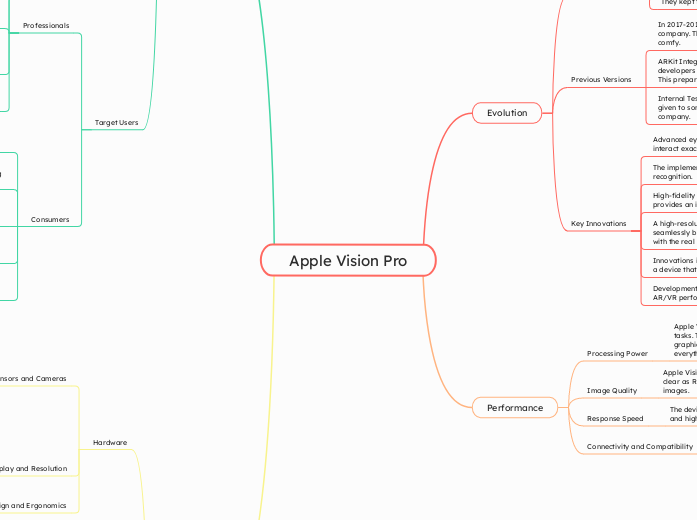por Marvin De la cruz 1 ano atrás
154
Apple Vision Pro

por Marvin De la cruz 1 ano atrás
154

Mais informações
Eye-tracking tech watches where you look, letting you control and interact in AR/VR exactly.
Voice recognition lets you control the device without using your hands.
Advanced gesture recognition lets you interact with digital objects and navigate menus with hand and finger movements.
The user interacts with the device using gestures, voice commands, and eye-tracking. The interface is easy to use, thanks to Apple's user experience design. Virtual menus appear in your view, so you can interact without physical controllers.
Educational Apps
Productivity Tools
AR/VR Games
Apple Vision Pro runs on a special version of iOS, probably called "visionOS," made for AR/VR apps. This OS works well with other Apple devices and services, giving a familiar and easy user experience.
The device is made to be comfortable, with lightweight materials and a shape that spreads the weight evenly.
The screens have high pixel density for clear images and to avoid the screen-door effect. The resolution is good for both close-up VR and distant AR overlays, giving a great visual experience.
Adjusts display brightness and contrast according to surrounding light conditions.
Combines accelerometers and gyroscopes for precise motion tracking.
High-resolution cameras for capturing the real world and enabling AR applications.
Depth Sensors for spatial awareness and accurate environment mapping.
Offers guided virtual workouts and wellness activities, creating interactive and motivating fitness experiences at home.
Helps users visualize home improvement projects by overlaying virtual furniture, decor, and architectural changes onto their real-world space.
Allows for virtual meetups and socializing in shared virtual spaces, enhancing connections with friends and family.
Enables users to watch movies and videos in a virtual theater setting, providing a more engaging and cinematic experience.
Provides an immersive gaming experience, allowing users to interact with virtual worlds and characters in ways that were not possible before.
Educators can create immersive learning experiences, and corporate trainers can develop realistic simulations for employee training.
Facilitates virtual meetings and collaborative workspaces where team members can interact with digital content and each other in a shared virtual environment.
Architects can create and showcase virtual models of buildings, while construction professionals can use AR overlays to visualize structures on-site.
Surgeons and medical professionals can use the device for virtual training and planning complex surgeries with 3D models of patient anatomy.
Allows engineers and designers to visualize and manipulate 3D models in real-time, enhancing the design process and enabling more accurate prototyping.
Patient Education:
Medical Visualization
Therapy and Rehabilitation
Surgical Training
Social Experiences
Interactive Storytelling
Immersive Games
Offering virtual field trips to places that are otherwise inaccessible.
Simulating real-life scenarios for vocational training.
Creating immersive educational environments where students can interact with 3D models and virtual objects.
Providing immersive gaming experiences where users can interact with a fully virtual world.
Training simulations for professionals, such as flight simulators for pilots.
Exploring virtual recreations of real-world locations, such as museums or historical sites.
Displaying contextual information about objects and landmarks.
Allowing customers to see how products will look and fit before purchasing.
Visualizing furniture and decor in a real room.
Providing turn-by-turn directions overlaid on the real world.